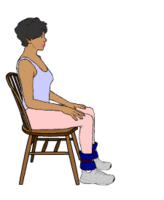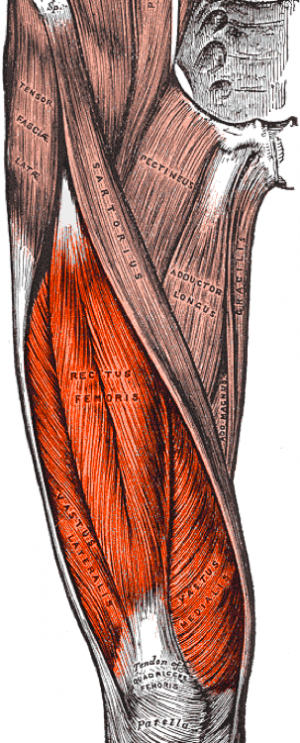Knee Extensors
Original Editor - Lucinda hampton
Top Contributors - Lucinda hampton and Aminat Abolade
Introduction[edit | edit source]
The knee extensors play an essential role in human movement. The one agonist muscle that extends the knee is the massive quadriceps.
- Knee extension ROM is from full flexion to 5-10° hyperextension.
- The iliotibial tract (ITB) and tensor fascia latae (TFL) also play a role in knee extension[1].
- The knee extensors play a significant role in ADLs.
- The quadriceps femoris, which is said to be the largest muscle group, has a volume of 86.6 cu in (1420 cu cm)[2].
Extensors[edit | edit source]
The quadriceps femoris consists of four individual muscles, three of the heads arise from the femur, the vastus intermedius, vastus medialis, and vastus lateralis. The fourth head, rectus femoris, arises from the hip bone. All four heads converge on the quadriceps tendon. They form the main bulk of the thigh, and collectively are one of the most powerful muscles in the body.[3] The quadriceps in the agonist of knee extension[4]. Synergists include:
- The ITB: an extensor of the knee, its function however is dependant on the position of the knee joint. It is an active knee extensor from 20 to 30 degrees of flexion to full extension[5].
- The TFL works with the ITB to stabilize the knee when it is in full extension[6].
Physiotherapy Significance[edit | edit source]
The knee extensors are essential for daily activities eg climbing stairs, getting up from the chair, walking (getting used significantly when going downhill).
The knee extensors are important in many sports eg kicking, jumping, cycling, running, basketball (requires jumps)[7].
Knee extension strength is a significant determinant of performance on static and dynamic balance tests.[8]
The term ‘muscle lag’ or ‘extensor lag’ or ‘quadriceps lag’ is a clinical sign with often profound functional relevance for patients during knee rehabilitation. See Knee Extension Lag
See also
Active Knee Extension Test, Passive Knee Extension Test
Knee Extension Resistance Test
References[edit | edit source]
- ↑ Radiopedia Knee Available: https://radiopaedia.org/articles/knee-joint-1?lang=gb(accessed 18.2.2022)
- ↑ Kidadl Biggest Muscle In The Body: Fun Body Facts Revealed For KidsAvailable: https://kidadl.com/fun-facts/biggest-muscle-in-the-body-fun-body-facts-revealed-for-kids(accessed 18.2.2022)
- ↑ Teach me anatomy. Muscles of the anterior thigh. Available from:https://teachmeanatomy.info/lower-limb/muscles/thigh/anterior-compartment// (last accessed 18.2.2022)
- ↑ Aclands Knee extensors Available: https://aclandanatomy.com/multimediaplayer.aspx?multimediaid=10528181(accessed 18.2.2022)
- ↑ Hyland S, Graefe S, Varacallo M. Anatomy, bony pelvis and lower limb, iliotibial band (tract). StatPearls [Internet]. 2020 Aug 10.Available: https://www.ncbi.nlm.nih.gov/books/NBK537097//(accessed 18.2.2022)
- ↑ Trammell AP, Nahian A, Pilson H. Anatomy, Bony Pelvis and Lower Limb, Tensor Fasciae Latae Muscle.Available: https://www.ncbi.nlm.nih.gov/books/NBK499870// (accessed 27.12.2021)
- ↑ Physiopedia Quadriceps Available:Quadriceps Muscle (accessed 18.2.2022)
- ↑ Carter ND, Khan KM, Mallinson A, Janssen PA, Heinonen A, Petit MA, McKay HA. Knee extension strength is a significant determinant of static and dynamic balance as well as quality of life in older community-dwelling women with osteoporosis. Gerontology. 2002;48(6):360-8. Available: https://pubmed.ncbi.nlm.nih.gov/12393951/(accessed 18.2.2022)








